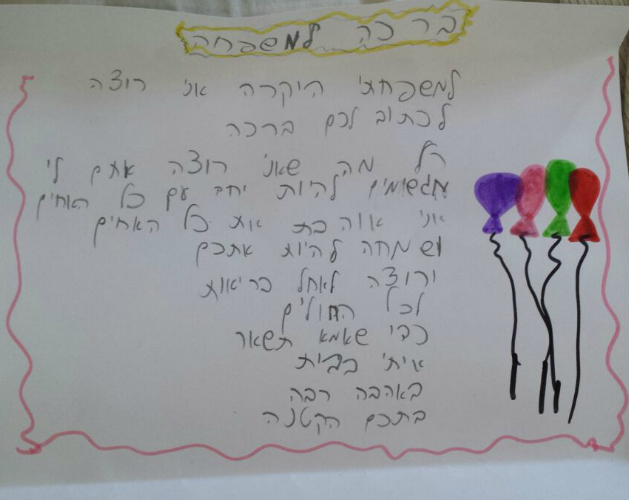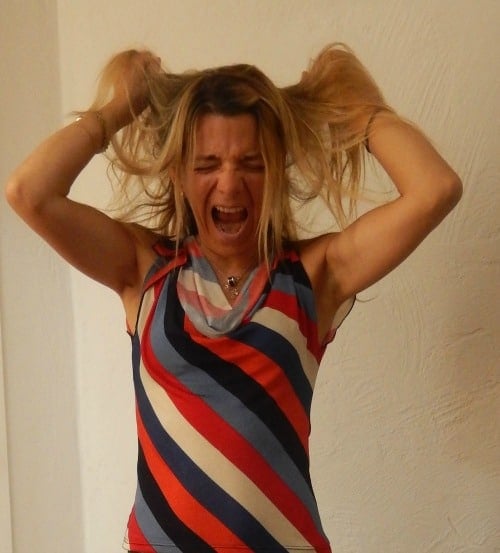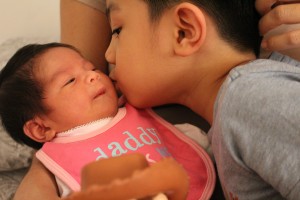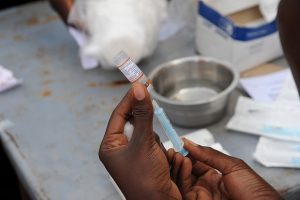
by Susie Newday (Israel) | Mar 11, 2015 | 2015, Israel, Life Balance, Parenting, Susie Newday, Working Mother, World Moms Blog, World Motherhood, Younger Children

I was blindsided.
It was Family Day, or Yom Hamishpacha, as it’s called in Hebrew. The day that somehow ended up replacing Mother’s Day here in Israel. My youngest was so proud of the card she had made for my husband and me. She had colored pictures of balloons, and had written all the words on her own.
I smiled as I read lines of “To my dear family, all the things I want you fulfill,” and, “I love my siblings and I’m happy to be with you.”
The sucker punch came at the end.
“I want to wish for health for all the sick people in the world so that my mom can stay home with me.”
Ouch. A heartfelt painful dagger to the heart. I was caught off guard. She had never said anything to me about not wanting me to work.
I work part-time, only three days a week. I’m a nurse in outpatient oncology. I do important work, fulfilling work. I work because my salary makes a difference in our finances. I work because if I don’t work, it’s that much harder to get back into it when you do want to work.
And yes, there are days when I wish I didn’t have to work. There are also many days when I’m glad I do work. Yet like every working mother, I’m constantly tormented by the demands of both worlds and with the impossibility of finding balance. I think the emotional and mental balance is even harder to find than the physical, task-related balance.
And then, when I think I’ve found that precarious balance, I get hit by innocent words, words pleading for more love and attention than I’ve been giving.
All I can do is accept what is, and try harder. Try harder to be true to my needs and to give those I love what they need.
The question is how.
Any tips?
This is a post original to World Moms Blog. Photo credit to the author.
Susie Newday is a happily-married American-born Israeli mother of five. She is an oncology nurse, blogger and avid amateur photographer.
Most importantly, Susie is a happily married mother of five amazing kids from age 8-24 and soon to be a mother in law. (Which also makes her a chef, maid, tutor, chauffeur, launderer...) Susie's blog, New Day, New Lesson, is her attempt to help others and herself view the lessons life hands all of us in a positive light. She will also be the first to admit that blogging is great free therapy as well. Susie's hope for the world? Increasing kindness, tolerance and love.
You can also follow her Facebook page New Day, New Lesson where she posts her unique photos with quotes as well as gift ideas.
More Posts - Website
Follow Me:






by Mirjam | Mar 9, 2015 | 2015, Cultural Differences, Netherlands, Parenting, Responsibility, World Motherhood
 My parents were born and raised in Surinam. They moved to the Netherlands in the 70’s and raised their children there. Though not completely oblivious to Dutch culture, the way my parents raised me was greatly influenced by the motherland. That includes the way chores were done.
My parents were born and raised in Surinam. They moved to the Netherlands in the 70’s and raised their children there. Though not completely oblivious to Dutch culture, the way my parents raised me was greatly influenced by the motherland. That includes the way chores were done.
In Surinam, and I’m guessing in many non-Western (“Second World”) cultures, chores are simply a part of life. They are part of a daily routine in which all family members share the responsibility of running a household. As a kid, you go to school, do your chores and play in the time that is left. Dinners are prepared together, cleaning is a joint effort and in some cases, children even help parents with their jobs. Except for that last part, this is basically the way I was raised.
My Dutch husband has been raised completely differently. Chores were the responsibility of his parents. They took care of everything and as he got older, chores were gradually given to him as a way to teach him responsibility. I must add that not all Dutch kids are raised exactly the same and that there are many varieties, but the difference between Dutch and Surinam upbringing is apparent.
One of the thoughts behind Dutch upbringing: “Let children be children, let them play. Let them enjoy childhood without too many responsibilities. The time for responsibilities will come soon enough.”
Personally this thought appeals to me yet also conflicts me. I fear that my children will become entitled, spoiled and unable to deal with responsibilities if I simply let them play.
One of the thoughts behind Surinam upbringing: “Chores are normal and necessary and help kids to become responsible independent adults. Every member of the family has to do their share, family comes before individual needs.”
Having to raise children now myself, I need to find a balance between these very different approaches. And it is not easy to find a middle ground. My husband tends to have a “Here, let me do it for you” attitude. And I have a more “I am not your maid, I will teach you to do it yourself” attitude.
I have a sense of contentment and pride when I teach my kids to do their chores independently and without complaint. But I also understand how nice it is for a child to be shielded from too much responsibility and to simply be taken care of. I want to let my kids enjoy their free time in between school, homework and sports, but I also want them to help around the house and feel like they share some of the responsibility of our household.
And so I go back and forth. Some of my Dutch friends drop their jaws or raise their eyebrows when they learn that my kids clean, vacuum, mop their rooms and scrub the toilets every weekend. And my mother will feed my guilt by asking me why I don’t let the kids help around the house more.
My background does have one distinctive benefit. When my children moan about having to do chores, I tell them about my childhood and they stop complaining immediately.
What are your thoughts about chores? Does the way you raise your kids look more like the Dutch way or the Surinam way?
This is an original post to World Moms Blog by Mirjam of The Netherlands. Photo credit to the author.
Mirjam was born in warm, sunny Surinam, but raised in the cold, rainy Netherlands.
She´s the mom of three rambunctious beauties and has been married for over two decades to the love of her life.
Every day she´s challenged by combining the best and worst of two cultures at home.
She used to be an elementary school teacher but is now a stay at home Mom. In her free time she loves to pick up her photo camera.
Mirjam has had a life long battle with depression and is not afraid to talk about it.
She enjoys being a blogger, an amateur photographer, and loves being creative in many ways.
But most of all she loves live and laughter, even though sometimes she is the joke herself.
You can find Mirjam (sporadically) at her blog Apples and Roses where she blogs about her battle with depression and finding beauty in the simplest of things. You can also find Mirjam on Twitter and Instagram.
More Posts - Website
Follow Me:



by Nadege Nicoll | Mar 6, 2015 | 2015, Adolescence, Boys, Communication, Family, Home, Humor, Kids, Life, Motherhood, Nadege Nicoll, Older Children, Parenting, Relationships, USA, World Motherhood, Younger Children

At the beginning of 2014, World Moms Blog asked me to define the coming year in one word. I replied: TRINITY.
No, I didn’t think I was a goddess – although feel free to disagree. . . in 2014, I was going to be three different mothers.
I have three kids, and for the first time, each of them was in a different developmental stage. I wasn’t sure whether this was good news or sit-tight-and-ride-the-wave news. But I felt ready, I was going to tackle that motherhood business with optimism and cheers.
(more…)
Nadege Nicoll was born in France but now lives permanently in New Jersey with her family. She stopped working in the corporate world to raise her three children and multiple pets, thus secretly gathering material for her books. She writes humorous fictions for kids aged 8 to 12. She published her first chapter book, “Living with Grown-Ups: Raising Parents” in March 2013. Her second volume in the series just came out in October 2013. “Living with Grown-Ups: Duties and Responsibilities” Both books take an amusing look at parents’ inconsistent behaviors, seen from the perspective of kids. Nadege hopes that with her work, children will embrace reading and adults will re-discover the children side of parenthood. Nadege has a few more volumes ready to print, so watch this space…
More Posts - Website
Follow Me:



by Martine de Luna (Philippines) | Mar 5, 2015 | 2015, Family, Philippines, World Moms Blog, World Motherhood, Younger Children
 I’m a new mom all over again.
I’m a new mom all over again.
On January 31st, my family welcomed a daughter, who was an answered prayer and an angel rolled into one cute and cuddly package. We had waited 4 years before deciding to get pregnant again, and so her coming was planned, stemming from a decision my husband and I made that, yes, we wanted to have another baby.
At the time when I learned I was pregnant, a slew of emotions came over me: joy, anticipation, excitement, and all the good fuzzy feelings that come with the thought of having a child you’ve been waiting for. But the strongest feeling that came over me wasn’t all fuzzy-wuzzy and free. I felt a type of uncertainty, honestly.
Could my heart really love another little human being as much as I loved my firstborn?
Well, this last month — the first month of my daughter’s life — I found out that when God decides to give you more kids, your heart grows as well. I feel so much love for both my children.
When I saw my daughter seconds after she came out of me, I felt instantly transported back in time to the birth of my son five years ago, when I felt a surge of energetic, powerful love for my child. I felt the same this time with our daughter, and yet totally different, too. When we went home from the hospital, realizing that there would forever be four of us in the family was also both delightful and daunting.
It’s not been easy. The other day I mused on Instagram about how happy yet extremely hard it is to grow the space in my mommy heart, how difficult it has been especially for my eldest child to adjust with the new person in our home, and how physically tired I feel from the past weeks of newborn care. It’s not that I feel torn between my children — not at all. However, I feel the growing pains, the sweetness and pain. Being a mom of two doesn’t split my heart in two. I know love my both my kids equally, but it is with a love that both enlarges my heart yet feels like it tears it, too.
Does that make sense? I don’t know. All I know is that I’m learning a new way of loving, and that my heart is expanding to accommodate two loves of my life right now. (Well, three, of course, including my husband!)
I’m at the start of a new leg of the journey now. I am excited yet uncertain, but I know for sure that I am full of love and expectancy. I don’t want to rush through any of it! I don’t want to miss out anything my children need me for, whether it be the little one who needs milk, cuddles and carrying, or the “bigger little one” who needs extra understanding, hugs and exclusive mommy time. These tender days of “mommy heart growth” will pass as quickly as my kids shoot up in height! I have got to slow down to savor the accelerated pace of their childhood.
Moms, how did you feel when you had your second child? Can you relate with me?
This is an original post by Martine De Luna for World Moms Blog. Martine is the resident “blissmaker” on her lifestyle inspiration blog, Make it Blissful.
The image used in this post is credited to the author.
Martine is a work-at-home Mom and passionate blogger. A former expat kid, she has a soft spot for international efforts, like WMB. While she's not blogging, she's busy making words awesome for her clients, who avail of her marketing writing, website writing, and blog consulting services. Martine now resides in busy, sunny Manila, the Philippines, with her husband, Ton, and toddler son, Vito Sebastian. You can find her blogging at DaintyMom.com.
More Posts

by Jacqueline Jenkins (Jordan) | Mar 4, 2015 | 2015, Jordan, Technology, Traditions, Uncategorized, World Motherhood
 Outside Amman, the capital city of my new home, life continues to unfold much as it has for centuries. Or so it seems at first glance.
Outside Amman, the capital city of my new home, life continues to unfold much as it has for centuries. Or so it seems at first glance.
Recently, during a trip to Wadi Rum and Petra, we met and dined with many local Bedouin people. For dinner, they invited us to share the meat of a sheep which had been freshly slaughtered for our visit. Our hosts had different histories and journeys that brought them around the fire pit, but they all shared a wonderful pride for their country, their renowned hospitality, and their treasured historical and geological landmarks.
Mubarak, a man about my age, with a weathered face and kind, soft eyes, talked to me for hours around the fire. He told me of his family’s history, the way he grew up moving from one part of the desert to another during different parts of the year, herding sheep and searching for firewood. He talked of the Bedouin people’s common ancestry and desire to keep traditions alive, and about his favorite sand dune in the whole desert–his eyes clouded over as he recalled memories of the spot and described how the sand is as fine as flour. Then, without even a second thought, he grabbed his mobile phone out of his flowing, white shirt and asked if I would like to Skype with his friends Robert and Dee in Mexico.
To me, two worlds collided.
I couldn’t help but fall back on my elbows and laugh.
My children, like yours, are growing up in an ever-changing world. Preserving unique cultures, traditions and practices is becoming more difficult as we connect digitally through Skype, Facebook, What’sApp and other technology.
I see technology as a great equalizer, an incredible tool for those in the developing world–but also as something to treated with great care if we are to preserve the traditional practices in the world.
What do you do with your children to preserve family or cultural traditions? Does technology help or hinder your efforts?
Photo credit to the author. This is an original post to World Moms Blog.

We are a few months into our new 'home of our heart' location in Amman, Jordan. Originally from Canada, I have been moving around the globe for more than twenty years as my husband works for UNICEF. While we were a carefree couple in Uganda, Lesotho and Bangladesh, Meghan joined our family in 2000, while we were living in Myanmar. She was joined in 2005, while we were posted in India by Charlie, her energetic younger brother! Since then we have lived in Mozambique and New York. I am an educator and have been incredibly fortunate to have found rewarding jobs in international schools wherever we have been posted. Most recently I was the Elementary School Principal at the United Nations International School in Manhattan. Since arriving in Jordan, I have been a stay at home Mum, exploring, photographing and learning about the incredible history of the region and the issues facing not only the Jordan population but the incredible number of Syrian refugees currently residing in the country. While I speak English and French, I have not yet started to learn Arabic; a big goal for our time here.
I write to record and process this incredible journey we are on as a family. Time passes so incredibly quickly and without a recording of events, it's hard to remember the small moments and wonderings from each posting. Being a mother in this transient lifestyle means being the key cheerleader for our family, it means setting up and taking down a house with six weeks notice, it means creating close friendships and then saying goodbye. All this, while telling yourself that the opportunities your children have make the goodbyes and new hellos worthwhile. Raising a child in this lifestyle has incredible challenges and rewards. The challenges include culture shock every single time, even when you feel the move will be an easy one. It means coaching yourself, in your dark moments to be present and supportive to your children, who have not chosen to move but are trusting you to show them the world and the meaningfulness of the lifestyle we have committed to as a UNICEF family. The upsides to this lifestyle are incredible; the ability to have our children interact and learn about cultures, languages, food, and religions firsthand, the development of tolerance and empathy through relationships with many types of different people and the travel, they have been to more places before the age of ten than some people do in a lifetime! My commitment to raising children who believe in peace and feel responsible for making a difference in creating a better world is at the core of everything I do.
More Posts
Follow Me:


by Kirsten Doyle (Canada) | Mar 2, 2015 | Autism, Canada, Childhood Illnesses, Health, Kids, Vaccines, World Motherhood
 My older son was born in 2003 and diagnosed with autism in 2007, when proponents of the vaccine/autism link were at their loudest. Since my son had displayed autism-like tendencies from birth, I never bought into this theory, and both he and his younger brother are up-to-date with their vaccines.
My older son was born in 2003 and diagnosed with autism in 2007, when proponents of the vaccine/autism link were at their loudest. Since my son had displayed autism-like tendencies from birth, I never bought into this theory, and both he and his younger brother are up-to-date with their vaccines.
I find myself constantly having to defend my parenting choices where vaccinations are concerned. I get accused of not doing my research (I have), of supporting the interests of Big Pharma (I really have no feelings about Big Pharma one way or the other), and of pumping my children full of toxins (most of the ingredients in vaccines are present at higher doses in what we eat, drink and breathe).
The whole debate mystifies me a little, not only because of the overwhelming scientific evidence refuting the autism/vaccine link, but because there are those who believe that autism is such a bad thing that they are willing to force bleach enemas into their kids to “flush out the vaccines”. I hate to break it to you, but if you do that, your kid will be seriously ill, and he or she will still have autism.
A growing number of parents are basing their decisions not to vaccinate their children on myths instead of science. Some of these myths include the following:
1. Courts have confirmed the link between autism and the MMR vaccine. This myth is based on one Italian court case featuring a child who was diagnosed with autism a year after being vaccinated. The court found in favour of the child’s parents, and its ruling was based on a flawed, fraudulent report that has been discredited. And let’s face it, how much should we trust a court system that stated that a man cannot be convicted of rape if his victim was wearing jeans?
2. Vaccine shedding has resulted in more measles cases than unvaccinated kids. In one of the books in The Hitchhiker’s Guide To The Galaxy series, Douglas Adams likened the chances of something with the odds of dropping a ball bearing from a moving 747 and hitting an egg sandwich. The odds of vaccine shedding – the phenomenon of someone catching a disease from someone who has recently been given a live vaccine – are similar. There has been the one-in-a-gazillion case of the rubella portion of the MMR vaccine shedding into breast milk, and in over 55 million doses, there have been five reported cases of shedding in the Varicella chicken pox vaccine.
3. There is almost no autism in the Amish community, which does not vaccinate. Both parts of this statement are incorrect. Most Amish parents do vaccinate, and autism does exist in the Amish community, although at a lower rate than in the general population.
4. Diseases like measles and polio have been reduced not because of vaccines, but because of better living conditions. Substandard living conditions, including poor sanitation and lack of access to a safe water supply, exist in many poverty-stricken places in Africa. While some diseases, like bilharzia and cholera, spread very quickly in places like this, the incidence of measles and similar illnesses has dropped dramatically in places that have had vaccination programs.
5. People who vaccinate their kids have nothing to worry about. A common argument of those who choose not to vaccinate is, “If your kids are vaccinated, what are you so worried about?” That is true – I’m not too worried about my kids, whose shots are up to date. On the other hand, I am worried about the elderly person who lives in the same house as me. I worry about one of my loved ones, who is immune compromised because of the chemotherapy she is currently enduring. I worry about a friend’s two sons, who are transplant recipients and cannot receive vaccines. I worry about the pregnant women I know, and about the newborns who are too young to be vaccinated.
6. Measles, chicken pox and whooping cough are normal childhood illnesses. Anytime you put the words “normal” and “illness” into the same sentence, there is a problem. Illness, by its nature, is not normal. It’s a state of imbalance, of the body not functioning the way it’s supposed to. When these illnesses were common, it is true that many people got through them without serious consequences. But there were those who didn’t. There were the babies who died of pneumonia, the pregnant women who lost their babies, the kids who died of encephalitis, the people who suffered irreversible loss of sight.
7. The risk of vaccine injury means that no-one should vaccinate their kids. To play devil’s advocate for a moment, vaccine injury may exist. In a small percentage of the population, vaccines are alleged to cause serious illness and even death. But that is not the fault of the vaccine. It is simply a tragic result of the genetic makeup of some individuals. People who are at significant risk of vaccine injury have a very valid medical reason not to vaccinate – in fact, they are among the people we need to protect via herd immunity. But to say that no-one should vaccinate because of the few who are genuinely at risk is as ridiculous as saying that no-one should wear seatbelts because of the handful of people who have been harmed or killed by seatbelts in vehicle accidents.
When making the decision to vaccinate or not vaccinate, parents need to be driven more by the facts and less by emotion and media-generated fear.
Where do you stand on the vaccine debate? Do you believe that vaccines should be mandatory with an allowance for medical exemptions?
This is an original post to World Moms Blog by Kirsten Doyle (Running For Autism) of Toronto, Canada. Photo credit: PATH Global Health. This picture has a creative commons attribution license.

Kirsten Doyle was born in South Africa. After completing university, she drifted for a while and finally washed up in Canada in 2000. She is Mom to two boys who have reached the stage of eating everything in sight (but still remaining skinny).
Kirsten was a computer programmer for a while before migrating into I.T. project management. Eventually she tossed in the corporate life entirely in order to be a self-employed writer and editor. She is now living her best life writing about mental health and addictions, and posting videos to two YouTube channels.
When Kirsten is not wrestling with her kids or writing up a storm, she can be seen on Toronto's streets putting many miles onto her running shoes. Every year, she runs a half-marathon to benefit children with autism, inspired by her older son who lives life on the autism spectrum.
Final piece of information: Kirsten is lucky enough to be married to the funniest guy in the world.
Connect with her on Facebook, Twitter and Instagram.
Be sure to check out her YouTube channels at My Gen X Life and Word Salad With Coffee!
More Posts
Follow Me:
















 I’m a new mom all over again.
I’m a new mom all over again.






